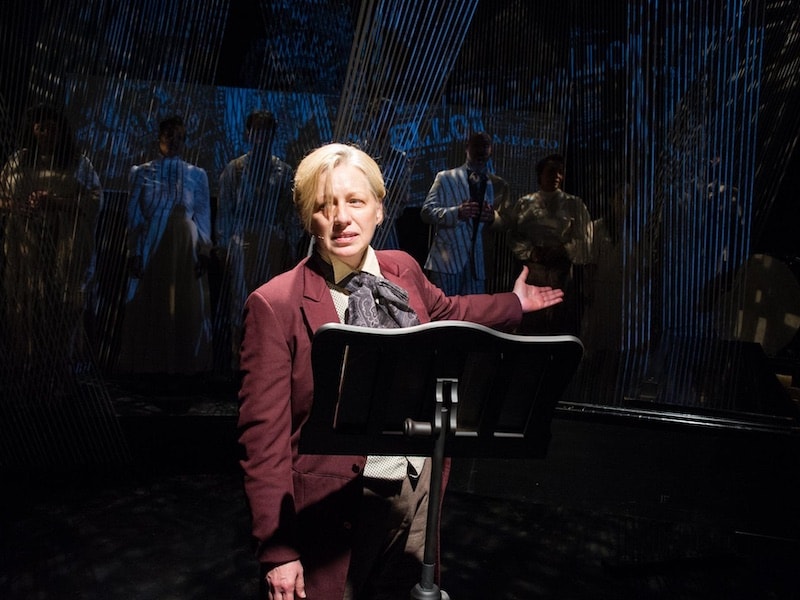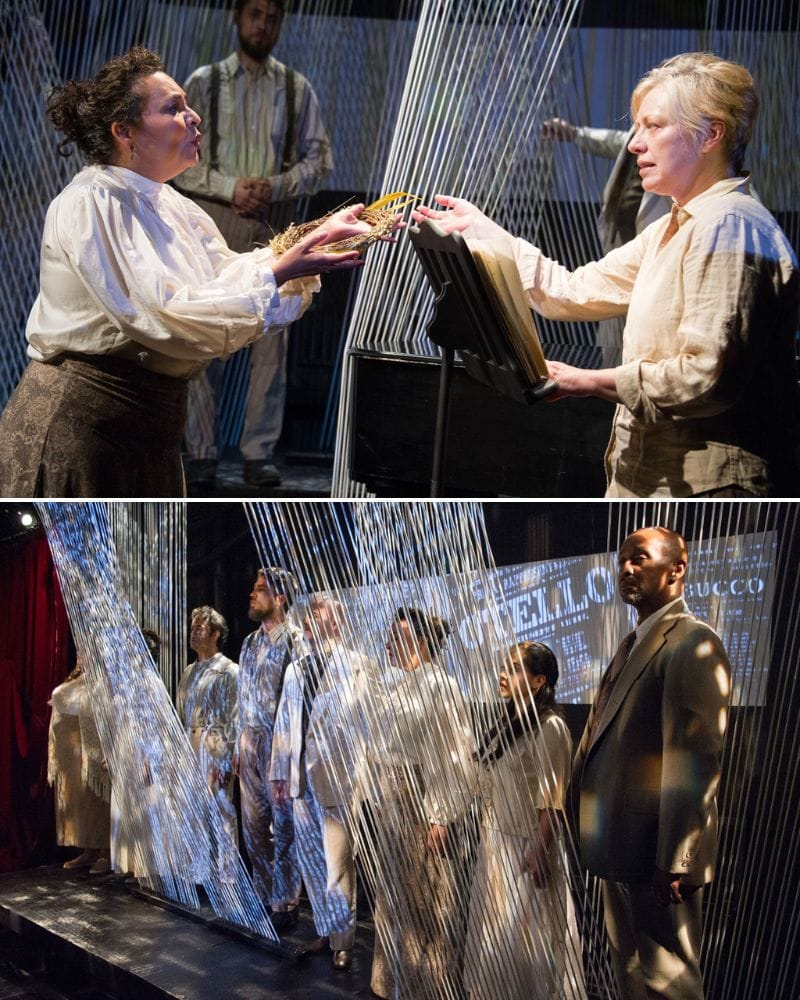By Timothy Nelson, IN Series artistic director
Editor’s note: IN Series resurrects its acclaimed The Promised End, first presented in 2018, from November 18 to December 10 in DC, as part of the city-wide Shakespeare Everywhere Festival, and November 15 to 17 in Baltimore. The music-theater experience combines Verdi’s Requiem performed by eight vocal artists (Teresa Ferrara, Natalie Conte, Elizabeth Mondragon, Gayssie Lugo, Brian Arreola, Henrique Carvalho, Andrew Adelsberger) and a one-woman monodrama featuring Helen Hayes Award–winning actor Nanna Ingvarsson depicting the composer Verdi, the play King Lear, and Lear himself. Here, in his own words, IN Series artistic director Timothy Nelson takes us inside the creative process that led to the unlikely mashup.

I have a favorite line written by the 13th-century Sufi poet Jalal al-Din Muhammad Rumi:
There is a great mutual embrace always happening between essence and accident.
While this line is true in all facets of our lives, I connect particularly with the way it describes the creative process — so little of which, for me at least, is consciously envisioned, instead being discovered by moments of seeming happenstance.
In 2018, in the months before I relocated from London to begin a new adventure in Washington, DC, as artistic director of what was then known as The In Series, I was handed the bones of a season already imagined by my predecessor and IN Series founder Carla Hubner. The fleshing out of that skeleton, which began with a “Verdi Cabaret,” was to be my job. I think Carla could see the grimace pass over my face at the idea of producing a pastiche of famed arias and ensembles by opera’s arguably greatest composer, Giuseppe Verdi. She quickly countered that I could actually do anything I wanted, as long as it was Verdi.
And with that began the creation of The Promised End, a work that would become pivotal in the life of our organization, and that also represents a wholly new way of fusing music and text into a form of expression unlike anything else. Now, five years and a pandemic later, and as part of the DC-wide Shakespeare Everywhere Festival, IN Series brings back The Promised End, that first work I produced as the organization’s artistic director, which, as unlikely as it seems, blends together Verdi’s unforgettable Requiem with Shakespeare’s most evocative and existential masterpiece King Lear.
I admit that on the surface Verdi and Shakespeare seem at best an unexpected pairing, and much of what brought these two epic sources crashing together in The Promised End was at first intuitive. There is, however, a historic and dramaturgic reason to link them — and then there is something else.
Verdi was not a composer who wanted to write until he dropped. In fact, he thought very carefully about the end of his life and what he wanted his last work to be. When he first decided to retire from creative work in 1874, at age 61, he made the surprising decision that a setting of the Catholic liturgy for the dead, a requiem, should be his final work. This was surprising because Verdi was not at all a religious man, and he had composed almost entirely music for the stage. Still, he wrote the famed Messa da Requiem, containing some of the most powerful and dramatic music ever imagined. Ultimately, however, Verdi was coaxed out of retirement to write two more operas, based respectively on Shakespeare’s Otello and Merry Wives of Windsor, the latter being a very different final statement than his Requiem would have been.
The choice of Shakespeare was not accidental. Verdi was obsessed with the works of Shakespeare, having already written a version of Macbeth. It was, however, King Lear that consumed Verdi. He tried his entire life to write the opera Re Lear but could never figure out how to approach so great a play, so bold a statement on human existence. Verdi, who never actually heard or read Shakespeare in English, even paraphrased the final words of the character Lear in the moment he suffered the stroke that would kill him. Standing at the mirror and doing up his shirt, Verdi uttered the phrase “one button more, one button less” just as his ability to speak was taken — this a version of Lear’s “Pray you Sir, undo this button.”
While the reasons Verdi could not climb the mountain of Lear are probably myriad, he most often said that he could not figure out how to write the storm scene, Shakespeare’s iconic third act of the play. This is an act, really an extended scene, in which (hu)man kind confronts the universe — the cold, cruel, isolation of being born and having to die. It is the existential quality of this act, which extends throughout the entire play, that made King Lear so popular in the 20th century as theater turned to the absurd. More than any other play of Shakespeare’s, King Lear is not about what it is about, but rather what lies underneath its woven metaphors — what it says and what it asks about our life, our death, and our relation to whatever lies beyond.

Anyone who has experienced the equally famous second movement of Verdi’s Requiem, the Dies Irae, knows that no piece of music more shatteringly depicts a personal howl from earth to the sky, the relentless and innate terror and horror of being alive, than does this music. Verdi may not have realized it, but he did write Lear’s storm. And not the storm only. Throughout the entirety of Verdi’s score, which moves from horror to transcendence, from misery to hope, toward the sublime and the ecstatic, Verdi, wittingly or not, captures the soul of Lear’s journey — a journey in which everything must be lost so that one single thing may be gained. The “things” in question include an understanding of the value of love, or rather life itself. Here is the link between Verdi and Shakespeare, between a requiem and the play of Lear.
But what actually is The Promised End? It is a performance piece that combines music and text in a way that is wholly novel. The entirety of Verdi’s score is performed by eight singers and a piano, creating an overwhelming intimacy with which Verdi’s music is never heard. At the same time, a one-woman monologue is performed by an actor playing Verdi discussing King Lear and eventually becoming Lear. The words themselves come from the play, but also from an essay on Kin by the world’s leading Shakespeare critic, Marjorie Garber. It is a tour-de-force performance for the actor, Nanna Ingvarsson,who must learn a solo text not only of epic proportion but one in which each block of text is connected to a bar, a beat, a phrase of music. Nothing like it has actually ever been tried to my knowledge.

What emerges is something totally new, where neither music nor text is dominant or in service tothe other, but rather joins to form a more powerful third form of expression. Sometimes the words are consumed by force of sound, sometimes music is bound in spoken text. That “disturbance” is the point, and it is the power of this novel type of experimental theater. Whereas in a play actors and directors decide subtext based on text, and in opera, the composer writes subtext in his music from the libretto handed to him, in The Promised End, the music came first, the subtext was the inspiration, and the text was built upon it. A new way of making music-theater was born.
When we first produced The Promised End in 2018, it changed the story of our company, but more importantly, it suggested to us, through both its essence and its accident, a vision for a type of expression that lands us as both theater and opera, and neither at all.
I can’t decide if The Promised End confirms or refutes Shakespeare’s oft-quoted (and misquoted) “the past is prologue,” but I do know that the experience of this unique, and uniquely IN Series, work engages a conversation alive with new possibilities. I’m excited to bring this work back in 2023, to give audiences another opportunity to experience its particular wonders, and to see how it may land differently, even more deeply, now.
The Promised End presented by IN Series plays from November 18 to December 10, 2023, at Source Theatre, 1835 14th St NW, Washington, DC. Tickets ($35–$55) can be purchased online. The Promised End also plays from December 15 to 17, 2023, at Baltimore Theatre Project, 45 West Preston Street, Baltimore, MD. Tickets ($20–$30) can be purchased online.
SEE ALSO:
‘Viva V.E.R.D.I. – The Promised End’ by the In Series (review of the first production by Leslie Weisman, September 18, 2018)
Shakespeare Everywhere Festival lineup announced (news story, August 29, 2023)





